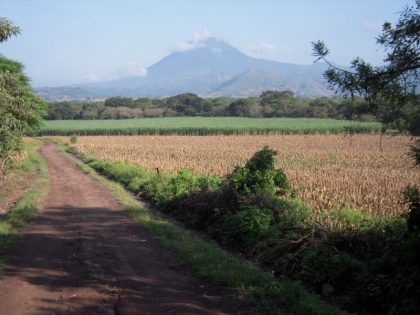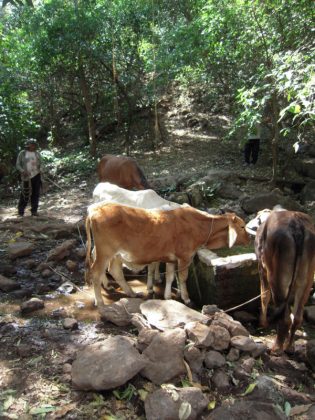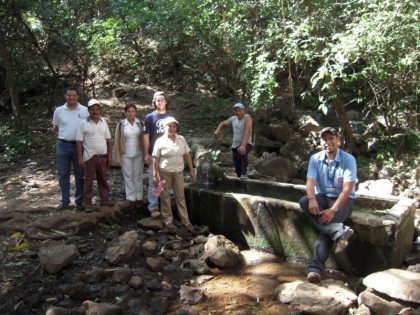 Location
Location
Canton El Coco, Municipio Chalchuapa, Departmento Santa Ana, El Salvador
Community Description
Area Natural Protegida La Magdalena is a 1,900-acre national forest reserve in western El Salvador consisting primarily of Volcano El Chingo and forming a part of the Salvadoran border with Guatemala. It is home to 119 species of trees, 158 types of vertebrates, 122 species of birds, and 24 natural springs (which supply water to all of the neighboring communities). While protection of this area is obviously critical to the future of the area’s population, specifically its health, it is also challenging due to pesticide use and run-off, the illegal gathering of firewood, and cattle grazing.
The protected area is managed by a Salvadoran (US-recognized) nonprofit, Asociación Salvadoreña Pro Salud Rural (Salvadoran Association for Rural Health), which works to protect and conserve the natural resources of the area, provide environmental education opportunities to nearby schools, visiting students, and the local community, and prevent and control forest fires.
 The protected area draws students and researchers from the National University in San Salvador, along with visiting university students from all over Central America and the United States. Visitors have been forced to stay far away due to the lack of available and acceptable sleeping options nearby, which hindered the potential of many of their trips.
The protected area draws students and researchers from the National University in San Salvador, along with visiting university students from all over Central America and the United States. Visitors have been forced to stay far away due to the lack of available and acceptable sleeping options nearby, which hindered the potential of many of their trips.
Without a fully-functioning camping area, the staff of the protected area is also not able to complete many of their ideal educational programs with youth such as weekend leadership retreats, night-time astronomy lessons, and night-time interpretive walks through the forest.
The camping area has now been completed, but it is still not completely serviceable because of the lack of bathroom facilities. While normal “pit” latrines are routinely used by the population of this area, the camping site’s proximity to a river and multiple springs along with the protected area’s desire and need to avoid contaminating this drinking water source, require the use of a more expensive, but safer and more sustainable, type of above-ground latrine.
Project Description
This project is to build a composting latrine to serve the camping area of the Area Natural Protegida La Magdalena.
The composting latrine will consist of two separate raised receptacles. Every 6 to 8 months, the use is rotated from one to the other. While one receptacle is in use, the other is composting, and within 6 to 8 months organic fertilizer is produced.
 Project funds will be used to purchase the bricks, concrete, metal roofing, and hardware for the composting compartments of the latrine.
Project funds will be used to purchase the bricks, concrete, metal roofing, and hardware for the composting compartments of the latrine.
The protected area will contribute all the labor for the construction, stone to build the latrine’s base, and a long-term maintenance budget and plan.
Project Impact
100 campers and visitors per year at the ANP La Magdalena will benefit directly from the project. At least 1,000 nearby residents will benefit indirectly from the removal of the potential for pollution of the groundwater.
Peace Corps Volunteer Directing Project
Max Greenblum
Comments
This project is critical to upholding the protected area’s requirements for preserving water quality to neighboring communities and maintaining acceptable sanitation options for its many visitors while allowing the protected area to continue the expansion of its environmental education programming.
It will provide an example for nearby communities of a more environmentally-friendly option for future latrine construction and supply the protected area staff with an organic fertilizer source that can help in the reforestation campaigns in surrounding schools.
Dollar Amount of Project
$500.00
Donations Collected to Date
$500.00
Dollar Amount Needed
$0.00 – This project has now been fully funded through the generosity of The Soneva SLOW LIFE Trust as a part of their Clean Water Projects initiative.
We encourage others to continue to donate using the Donate button below, and we will notify Max of your donation. Additional funds will be used to fund the next project by the PCV and/or other projects in the country of service.
This project has been finished. To read about the conclusion of the project, CLICK HERE.